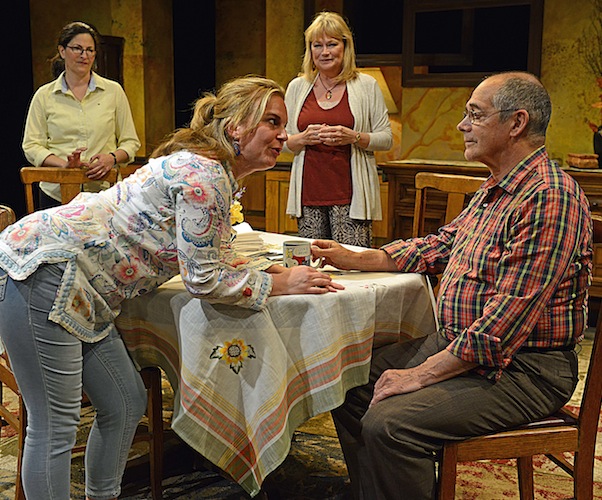Theater Review: Gloucester Stage Company’s “Sweet and Sad” — Subtle to a Fault
Unlike so many American dramatists today, Richard Nelson does not compel us to pay attention to his characters’ psychological disclosures, and his reluctance to underline is refreshing.
Sweet and Sad, by Richard Nelson. Directed by Weylin Symes. Presented by Gloucester Stage, in collaboration with Stoneham Theatre, Gorton Theatre, 267 East Main Street, East Gloucester, MA, through June 20.

Gloucester Stage Company production of “Sweet and Low.” Background L to R: Sarah Newhouse as Marian Apple Platt and Karen MacDonald as Barbara Apple; Foreground: Laura Latreille as Jane Apple Halls and Joel Colodner as Benjamin Apple. Photo: Gary Ng.
By Robert Israel
There are some plays that work slowly on audiences, pulling at them gently, creating a world on stage that eschews overt theatrical devices. In Richard Nelson’s Sweet and Sad, the second of his four plays about the Apple family in Rhinebeck, New York, it’s as if we’ve been asked to dinner. We are guests who have been invited to partake of the repast, but we are not allowed to speak or in any way disrupt the interactions of these family members who, we learn, gather together when momentous public events have affected their lives in traumatic ways.
In the first of the Apple family plays, That Hopey Changey Thing, the history-changing event was the 2010 midterm elections. For this play, it is the 10th anniversary of the barbaric demolition of the World Trade Center buildings in New York City. At first, the playwright doesn’t reveal that his focus will be on that overwhelming tragedy. His theatrical style is not confrontational; he plays his dramatic cards close to his vest. We wade through about a third of the way through this long one-act play before we realize what his mission is. In that sense, Nelson is exploring a naturalistic approach to storytelling, a commitment to the resonances of ‘real life’ that borders on reportage. And, of course, there are many other details about the family – marriages that have come apart, a suicide, an accident that has semi-blinded one of the family members — that require our attention, long before Nelson’s social concerns are introduced.
The Gloucester Stage/Stoneham Theatre production is not without its flaws, but those problems might be attributable to the script rather than to the actors. While the cast performs as a tightly knit ensemble, the details of their separate yet interwoven lives are not immediately apparent. If you have not seen the first play, it takes awhile to get your sea legs, to figure out how to balance while strolling onboard this ship; it means listening carefully for clues in the cadences and rhythms of the playwright’s language. If you are looking for insight into the hidden depths of the characters –- their emotional cores – you won’t find that articulated immediately either. Glimpses into their personalities come along, but through nuance and indirection. Unlike so many American dramatists today, Nelson does not compel us to pay attention to these psychological disclosures, and his reluctance to underline is refreshing. Look deeply, he seems to be saying, examine carefully what each character feels, connect those emotions with the feelings of the others, and you may catch a flash, a glimmer, of an inner life.
The play gains momentum midway, when the gathering of brothers, sisters, and significant others finish up the first course. We learn of losses, loves, anguishes, successes, and failures. We never feel how powerfully any of the painful events weigh on the characters, but, in a naturalistic setting, we wouldn’t – so we have to make our peace with that.
Perhaps the most effective performance here comes from veteran actor Joel Colodner, who plays Benjamin Apple. Colodner is an actor whose work I have greatly admired in the past, particularly in the Lyric Stage’s production of a stage adaptation of Chaim Potok’s novel The Chosen. In Sweet and Sad he plays a man who is struggling with dementia, a retired actor who cannot articulate his dark plight. Benjamin has now not only forgotten the lines of the characters he’s played in classic plays, but he no longer recognizes the people in the script of his own life, despite numerous reminders by his nieces and nephews. Colodner suggests what is going on inside Benjamin; the figure emerges as a haunted but not haunting specter who is still able to exert bits and pieces of his humanity. As Barbara Apple, the gifted Karen MacDonald shines as a flibbertigibbet, scurrying about making sure all are being served, cursing the noises that are invading the Apple home from around the neighborhood. Her sudden bursts of antic, frantic life are expertly honed contrasts to her uncle’s drift into befuddlement.
Gloucester Stage, along with Stoneham Theatre, have taken a nervy gamble on Nelson’s ultra-subtle approach to domestic/political drama in this series of plays. The unfortunate catch is that we are often left out as the Apples’ sweet and sad reminiscences parade by. We are puzzled and interested, but there are no redeeming revelations, no illuminating insights produced. We leave the production feeling like intrigued outsiders: these memories have aroused our curiosity, but they have not touched our hearts.
Robert Israel writes about theater, travel and the arts, and is a member of Independent Reviewers of New England (IRNE). He can be reached at risrael_97@yahoo.com
Tagged: 9/11, Apple Family Plays, Gloucester Stage Company, Richard Nelson
